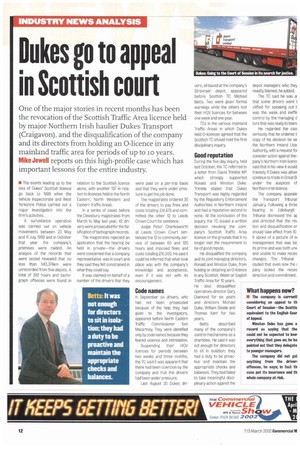Dukes go to appeal in Scottish court
Page 12

If you've noticed an error in this article please click here to report it so we can fix it.
One of the major stories in recent months has been the revocation of the Scottish Traffic Area licence held by major Northern Irish haulier Dukes Transport (Craigavon), and the disqualification of the company and its directors from holding an 0-licence in any mainland traffic area for periods of up to io years. Mike Jewell reports on this high-profile case which has important lessons for the entire industry.
II The events leading up to the loss of Dukes' Scottish licence go back to 1999 when the Vehicle Inspectorate and West Yorkshire Police carried out a major investigation into the firm's activities.
A surveillance operation was carried out on vehicle movements between 23 May and 11 July 1999 and in October that year the company's premises were raided. An analysis of the records that were seized revealed that no less than 543,374km were unrecorded from five depots. A total of 392 hours and tachograph offences were found in relation to the Scottish licence alone, with another 137 in relation to licences held in the North Eastern, North Western and Eastern Traffic Areas.
In a series of cases before the Dewsbury magistrates from March to May last year, 42 drivers were prosecuted for the falsification of tachograph records.
The magistrates rejected an application that the hearing be held in private—the drivers were concerned that a company representative was in court and they said they felt constrained in what they could say.
It was claimed on behalf of a number of the drivers that they were paid on a per-trip basis and that they were under pressure to get the job done.
The magistrates ordered 30 of the drivers to pay fines and costs totalling £14,675 and committed the other 12 to Leeds Crown Court for sentence.
Judge Peter Charlesworth at Leeds Crown Court sentenced the 12 to community service of between 60 and 120 hours and imposed lines and costs totalling £10.500. He said it could be inferred that what took place was with the company's knowledge and acceptance, even if it was not with its encouragement.
Code names
In September six dnvers, who had not been prosecuted because of the help they had given to the investigators, appeared before North Eastern Traffic Commissioner Tom Macartney. They were identified only by code names because they feared violence and intimidation.
Suspending their HGV licences for periods between two weeks and three months, the TO said it was apparent that there had been coercion by the company and that the drivers had been under pressure.
Last August 20 Dukes dri
vers, all based at the company's Stranraer depot, appeared before Scottish TO Michael Betts. Two were given formal warnings while the others lost their HGV licences for between one week and one year.
TCs in the various mainland Traffic Areas in which Dukes held 0-licences agreed that the Scottish TC should hold the first disciplinary inquiry.
Good reputation
During the five-day inquiry, held last October, the TO referred to a letter from David Trimble MP which strongly supported Ronald and Winston Duke. Trimble stated that Dukes Transport was highly regarded by the Regulatory Enforcement Authorities in Northern Ireland and had a reputation second to none. At the conclusion of the inquiry the TO issued a written decision revoking the company's Scottish Traffic Area licence on the grounds that it no longer met the requirement to be of good repute.
He disqualified the company and its joint managing directors, Ronald and Winston Duke, from holding or obtaining an 0-licence in any Scottish, Welsh or English Traffic Area for 10 years. Fie also disqualified operations director Gary Diamond for six years and directors Michael Duke, William Steele and Thomas Kerr for two years.
Betts described many of the company's control mechanisms as a shambles. He said it was not enough for directors to sit in isolation; they had a duty to be proactive and maintain the appropriate checks and balances. They had failed to take meaningful disciplinary action against the depot managers who they readily blamed, he added.
The TO said he was a that some drivers were I vtfdied for speaking out t was the weak and ineffe control by the managing d tors that was really to blarn He regarded the casi seriously that he ordered tl copy of his decision be se the Northern Ireland Lice Authority, with a request for consider action against the I pany's Northern Irish liceno said that in his view it would travesty if Dukes was allow continue to trade in Great B1 under the auspices of Northern Irish licence.
The company appeale the Transport Tribunal January. Following a three hearing in Edinburgh Tribunal dismissed the aL and directed that the ret tion and disqualification or should take effect from 10 It spoke of a picture of si management that was be its prime and was both unvi and unable to make neces changes. The Tribunal eluded that even now the pany lacked the neces direction and commitment.
What happens now?
• The company is curreetl considering an appeal to th Court of Session—the Seottis equivalent to the English Cour of Appeal.
Winston Duke has gone o record as saying that the could not be expected to knoi everything that goes on; he ha pointed out that they delegate to younger managers.
The company did not gal anything from the driver offences, he says; in fact th case put its insurance and th whole company at risk.
























































































































































